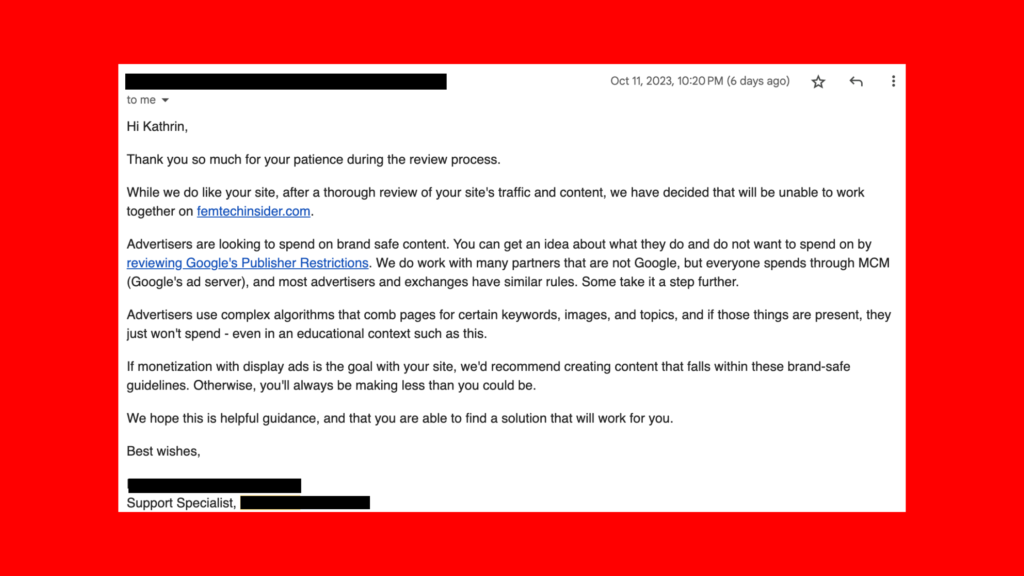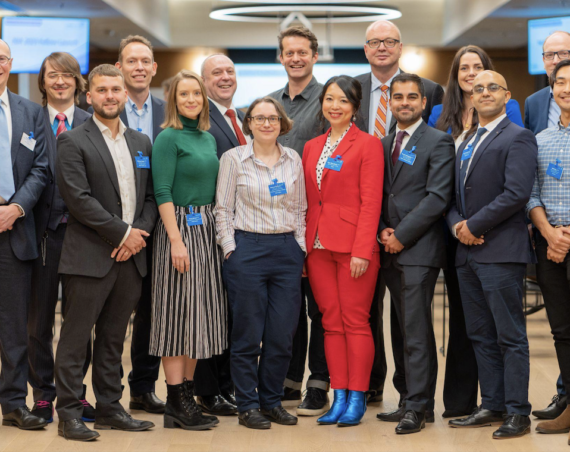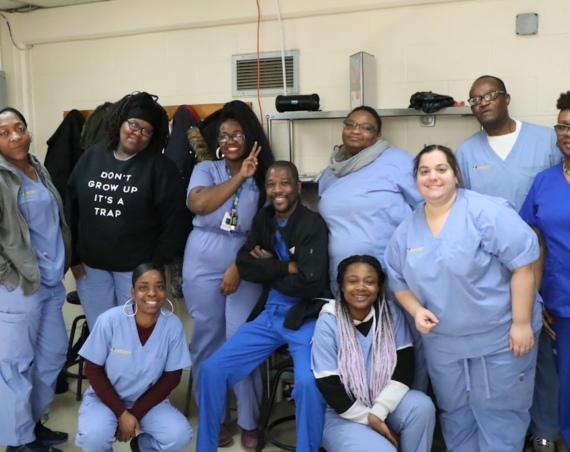
The rise of the digital age has brought with it many benefits. Among them are the near-infinite opportunities for brands to place their ads in front of potential customers. With this abundance, however, comes the challenge of ensuring that these ads appear in ‘brand-safe’ environments and advertising networks have put in place strict criteria and algorithms to ensure that brand messages aren’t shown next to unsuitable content.
But what happens when these algorithms and guidelines unwittingly undermine content that drives social progress?
Well. This exact scenario recently happened to us here at Femtech Insider. We’re a B2B media company covering the women’s health innovation ecosystem, yet our content is deemed “unsafe” by certain advertising networks, who cite Google’s Publisher Restrictions.
Thanks to the work of Jackie Rotman and the Center for Intimacy Justice we’ve had many conversations about the advertising challenges femtech and sextech companies face over the past couple of months. Sadly the situation isn’t much better for us publishers.
Femtech and the Brand Safety Paradox
As many of you reading this will know femtech is a burgeoning sector dedicated to addressing women’s health issues using technology and more broadly innovation. The term encompasses a broad range of products, services, and platforms – from fertility solutions to menstrual health trackers, and from platforms championing culturally-appropriate care to those discussing gender-related health disparities.
However, the very nature of these discussions — which often touch on topics like menstruation, reproductive health, and sexual wellbeing — means they may inadvertently fall afoul of ‘brand-safe’ algorithms. It’s ironic and somewhat disheartening. Content designed to drive societal progress, educate, and remove taboos is apparently considered ‘unsafe’ for brands.
The Unintended Consequences of Over-Censorship
While the intention behind brand safety is understandable, its blanket application can stifle important conversations. For instance, a discussion about menstrual health might be categorized in the same ‘unsafe’ bracket as explicit or harmful content, even if its intention is educational.
This kind of over-censorship has multiple repercussions:
Financial Challenges for Publishers: Publications and platforms operating in sectors like femtech may rely heavily on ad revenues to sustain themselves. Being denied access to advertising networks can cripple them financially, leading to reduced content output or even complete shutdown.
Suppression of Essential Conversations: By placing barriers on where and how femtech and sexual wellness content can be monetized, we risk muffling essential conversations. The very discussions that could drive societal progress, eradicate stigmas, and educate a broader audience are the ones being suppressed.
Perpetuating Stigma: By sidelining topics related to women’s health and labelling them as ‘non brand-safe’, we inadvertently perpetuate the age-old stigmas surrounding these subjects.
Redefining Brand Safety
The solution isn’t for publishers in the femtech space (or any niche sector promoting positive change for that matter) to dilute their content to meet brand-safe guidelines. Instead, it’s time for advertising networks and brands to rethink and redefine brand safety.
Brands have a powerful voice and a broad platform. By aligning with causes that drive social progress, they can not only enhance their image but also play a role in driving change. Instead of shying away from subjects like women’s health, brands should be at the forefront, championing these conversations and showing their support.
My Committment to the Femtech Insider Community
Femtech Insider’s mission is and always has been to spotlight and uplift advancements in women’s health innovation, as well as to create a platform for important discussions around these topics. I firmly believe that these discussions and the awareness they generate play a crucial role in driving positive change for women globally.
I respect that advertising networks and their partners have guidelines and criteria for publishers. However, pivoting our content away from our mission, simply to align with advertising algorithms, would be a disservice to our readers and the broader community we intend to serve.
Google is NOT my editor and you have my commitment that we will continue to support entrepreneurs, investors, researchers and innovators in this space, continue to tell your stories and create awareness for the much needed solutions you create, fund, and champion to advance women’s health on a global level.
I’m not gonna lie. Being rejected for doing the right thing sucks. But in the end it’s about being on the right side of history and we will not back down. 💪



